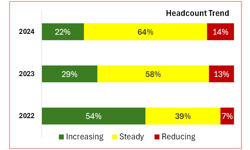
Now, none of this is new. The subject has been steadily growing in importance over successive surveys. Also, the theme has been centre stage at a number of industry conferences, where many of the larger companies – led by the Glassdoor star, Immediate – have been laying out their “people credentials”. These are impressive, carefully thought-through and well executed strategies. Yet dig a little deeper – deeper inside the companies themselves and deeper into the industry at large (a number of mediafutures respondents are SMEs rather than major multinationals) – and the picture is much more mixed and complex. There are some new themes:
People issues are now urgent
The rapid rate of change in every aspect of life and business means that new working practices and attitudes need to be executed much more quickly. An added layer of difficulty is that some companies are trying to shape and improve the ‘New Workplace’ at the same time as cutting headcount or having delicate discussions about working-from-home (WFH) and work-life balance. And all of this takes time and financial investment – both in short supply at the moment.
People issues are complicated
Here, a number of factors have come to the fore.
The first is the nature of the company:
- Company size makes a material difference to almost every metric and area of activity in the survey: from revenue diversification through tech stacks and on to people. Does the company have the resources to execute fast, and sometimes, radical change?
- Company location is often an underestimated factor. Working in a converted barn in the middle of nowhere may have seemed quite funky a few years ago, but is very different to being in a university town with a large pool of younger, tech-savvy employees. And then there is the old London versus provinces divide, which is becoming increasingly difficult to manage in all kinds of ways… salaries, staff churn, commuting versus WFH, etc.
- Company ownership. A family-run business has a very different perspective to a publicly quoted company or a private equity funded operation.
- M&A activity. An acquisitive company has real culture-clash challenges to deal with as it grows. And isn’t an office a better place to fast-track integration rather than a remote working environment?
The second factor is the shape of the company. Visions are easy to write (remember Liz Truss?). Culture is simple to describe, but much more difficult to change. Skills can be trained-in or bought-in. Yet having an organisation that can handle rapid change whilst still being transparent, accountable and fast-moving, is the real practical challenge. The good old “matrix organisation” is sometimes just an excuse for an ill-thought through fudge, which is often built around individuals (with their own personality quirks and egos) rather than hard business logic.
People issues are measurable
As I pointed out in a previous article (‘Lifetime Value for People’. Jan/Feb 2022 issue), you cannot assess people in the cold way you can other business processes and activities, but we have to do better than having no hard metrics at all. Productivity and efficiency KPIs are being used more widely than ever before, but with some howling mistakes being seen around the business. And it all comes home to roost in the same place: how to build a bonus / commission / incentive scheme that covers a wide range of revenue and non-revenue job roles. Solve that old chestnut and you are well on the way to getting it all sussed. And by the way, the most effective way to improve efficiency is having the tech stacks to automate many internal processes, but that’s the subject of another article!
People issues are critical
Predicting the future has become more complicated and unreliable. So, building an agile, flexible, dynamically responsive and skilled organisation that can surf the unforecastable waves and tides, has never been more important. Yet all this is going on as we fight to bring on board new staff in a media business which cannot compete with the salaries offered in other industries: a recurring theme in the mediafutures responses; as are staff development and retention.
“People are our biggest asset” is 100% true. Yet now is the time for that truism to be translated into a much more hard-edged reality.
About mediafutures: mediafutures is an annual benchmarking survey of the industry undertaken by Wessenden Marketing in partnership with InPublishing and Collingwood Advisory. Now into its 14th year, it covers consumer media, B2B, live events & exhibitions, news media and customer media, ranging from “traditional publishers” through to 100% digital pure plays, and from the major industry players through to smaller, independent businesses. It maps the key drivers and metrics that are transforming the shape and direction of the whole media business.
This article was first published in InPublishing magazine. If you would like to be added to the free mailing list to receive the magazine, please register here.










